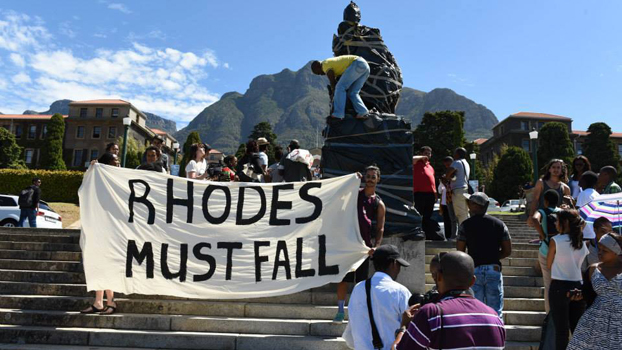South Africa is a country of approximately 56 million people located at the most southern part of Africa. Often referred to as the “Rainbow Nation” its population is multiethnic consisting of Africans who make up 80.2% of the population, coloureds, 8.8 %, descendants of Europeans also called white people, 8.4% and Asians (mostly people of Indian and Chinese descent), 2.5%. Since gaining independence from the British in 1910 and becoming a democracy in 1994, the country has seen a steady rise in equality and economic growth. However, it still grapples with increasing disparities between the rich and poor, high unemployment and other social, political and economic issues.
 #RhodesMustFall UCT 2015
#RhodesMustFall UCT 2015
In March 2015 students and staff members at the University of Cape Town protested for the removal of the statue of Cecil John Rhodes, a businessman, mining magnate and former Prime Minister of the Cape Colony. They also called for the decolonisation of education on their campus and those around the country saying that statue of Rhodes was symbolic of white supremacy and the continued perpetuation of institutionalised racism in South Africa and its academic establishments. This saw the rise of the #RhodesMustFall and other universities in the country and around the world supporting the movement, most notably the University of Oxford. The statue was removed a month later however this incident sparked a series of other protests that sought the removal of the different monuments of those who sustained and supported apartheid policies in other parts of the country. Thus calling into question the significance and the impact of memorials dedicated to those who orchestrated the marginalisation and oppression of people of colour. Subsequently, around mid-October of 2015, students at the University of the Witwatersrand began to protest in response to the increase in university fees. Given the slow economic growth at the time and many of them being first generation students who took out loans to fund their education. The fact that many of their parents did not receive a university education and were socially and economically marginalised as a result of the apartheid policies meant that many of students were facing the possibility of academic exclusion. The reality being that a BSc at an elite institutions costed ZAR50,000 ($3,700) and the average annual income was ZAR88,000 ($6,600).
The quest to decolonise education in South Africa can be linked to conflict theory and racial stratification. It is widely known that academia is dominated and deeply rooted in Eurocentric/ Western viewpoints and does not allow for the contribution of knowledge from indigenous knowledge systems. Thus as a result of colonialism and apartheid, many of the universities in South Africa continue to perpetuate eurocentrism and institutionalised racism and are also dominated by ‘white, male, Western, capitalist, heterosexual with European worldview.’ professors. Although African students comprise the majority of university entrants the demographics of the country address this fact and the legacy of apartheid continues as in relation to population, the proportion of black students who attend university is significantly lower than that of white students. This is due to many factors including access to quality education and familial economic background. Hence the dominance of eurocentric narratives and the legacy of apartheid preserve the current and colonised state of education.
As part of decolonising education, students and staff have called for a shift in perspective of the academic narrative whereby more professors of colour are instated, classes to be held in indigenous languages, afrocentricity in curriculum and the process of decolonised education to be led by indigenous academics as they say education serves the interests of those whose perspective it is from and it is only through decolonisation African interests can be advanced for the betterment of African peoples.
In accordance with these events, recently the Department of Education is planning on cutting back on the readings of Shakespeare in primary schools to focus on African literature depending on the students indigenous language. And most notably the University of Johannesburg has created a compulsory “African Insights” course for all first year undergraduates and appointed Nobel Laureate, Professor Wole Soyinka to join the faculty of humanities and help create a new curriculum.
[Disclaimer: This article only touches the surface of the issues explored. There is far more information on this subject and the contributing factors mentioned above which are also very complex & couldn’t be unpacked fully.]
Works cited:
Evans, Jenny. “What is decolonised education?” News24. Published September 25, 2016. Accessed April 1, 2017. http://www.news24.com/SouthAfrica/News/what-is-decolonised-education-20160925
Grant, Laura. “How much will it cost you to go to a South African University in 2016?”. Africa Check.Published October 26, 2015. Accessed April 1, 2017. https://africacheck.org/reports/how-much-will-it-cost-to-go-to-a-south-african-university-in-2016/
Heleta, S., 2016, ‘Decolonisation of higher education: Dismantling epistemic violence and Eurocentrism in South Africa’, Transformation in Higher Education 1(1), a9. http://dx.doi.org/10.4102/the.v1i1.9
Kamanzi, Brian. “#FeesMustFall: Decolonising Education” Al Jazeera. Published November 3, 2016. Accessed April 1, 2017. http://www.aljazeera.com/indepth/opinion/2016/10/feesmustfall-decolonising-education-16103109
Lehohla, Minister PJ. “Community Survey 2016: Statistical release.” . StatsSA. Published 2016. Accessed April 1, 2017. http://cs2016.statssa.gov.za/wp-content/uploads/2016/07/NT-30-06-2016-RELEASE-for-CS-2016-_Statistical-releas_1-July-2016.pdf
Staff Writer. “This is the average salary in South Africa by race and industry”. Business Tech. Published July 26, 2016. Accessed April 1, 2017. https://businesstech.co.za/news/wealth/131524/this-is-the-average-salary-in-south-africa-by-race-and-industry/


No comments:
Post a Comment
Note: Only a member of this blog may post a comment.